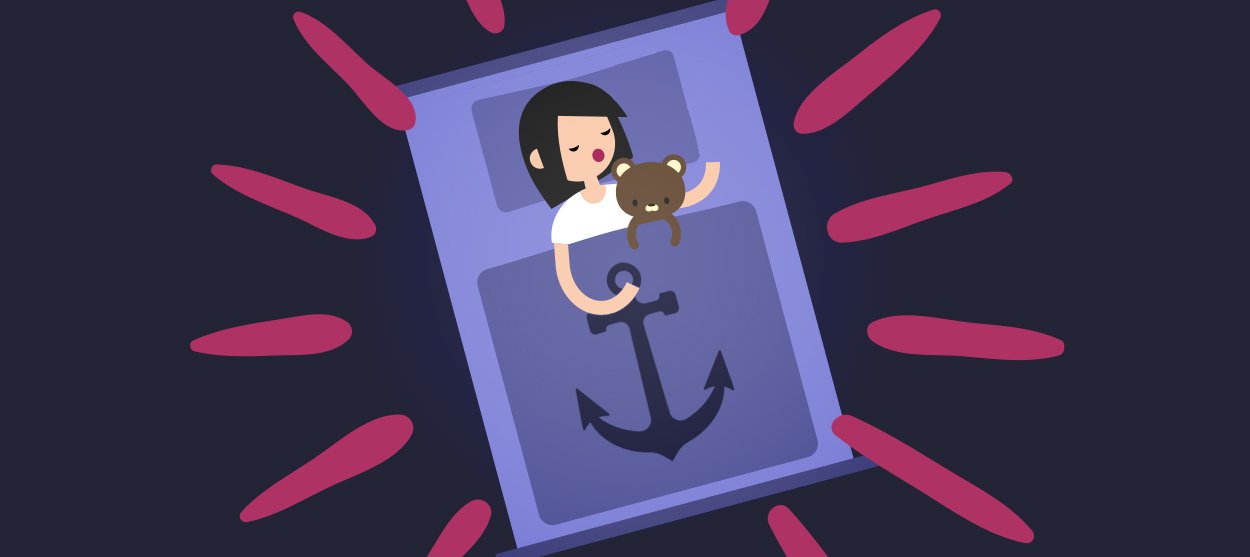Weighted blankets are the new parenting trend. Do they work?
Is there any science behind claims that weighted blankets can help anxious kids?


A free daily email with the biggest news stories of the day – and the best features from TheWeek.com
You are now subscribed
Your newsletter sign-up was successful
When Pamela Hunter's young daughter Ransom was diagnosed with a neurological condition called sensory processing disorder, Hunter noticed that Ransom was often calmed when draped in a homemade woven blanket. "I tested it out on her and immediately we saw her body relax," Hunter says. In the years since, Hunter launched Sheltered Co., a Los Angeles company that sells hand-woven, large, slightly heavy blankets made from sustainable materials. So-called weighted blankets are having a moment, as doctors and celebrities sing the praises of these hefty textiles. Some claim weighted blankets can help people with autism, sensory difficulties, restless legs, insomnia, anxiety, depression, and other ailments. But what exactly do they do? And are they safe for kids?
The theory around weighted blankets is that they can help treat anxiety by relaxing the nervous system. "It's hypothesized that the deep pressure and more consistent sensory input provided by these weighted items reduces the level of arousal and stress which our body physiologically has," explains Dr. Amna Husain, pediatrician and founder of Pure Direct Pediatrics. It sounds complicated, but essentially, the soothing effects of a weighted blanket are similar to those you might feel upon receiving a hug when you're upset or anxious.
Pediatric occupational therapist Natasha Bravo likens weighted blankets to baby swaddles. "When a baby is swaddled, they are experiencing evenly distributed pressure around the entire contour of their body which is calming and grounding," she says of the cocoon-like experience weighted blankets can provide. "Gentle consistent pressure can also impact breathing patterns into more deep and slower breaths."
The Week
Escape your echo chamber. Get the facts behind the news, plus analysis from multiple perspectives.

Sign up for The Week's Free Newsletters
From our morning news briefing to a weekly Good News Newsletter, get the best of The Week delivered directly to your inbox.
From our morning news briefing to a weekly Good News Newsletter, get the best of The Week delivered directly to your inbox.
The blankets are being used in some educational settings, such as the Manhattan Children's Center, a school for autism education, to help children feel calm and focused — and to improve their sleep. Indeed, "weighted blankets seem to be the latest trend regarding sleep," Dr. Husain says. "I've seen claims from the fact that they increase serotonin to decreasing anxiety. I do find that it can help reduce restlessness so if you find yourself tossing and turning throughout the night, a weighted blanket might be a solution."
But, she cautions, "the place of weighted blankets in pediatrics still has little data." She describes a 2014 European study that found weighted blankets were no more effective than regular blankets at improving total sleep time for children with autism. But anecdotally, they seem to work. "Children are more likely to prefer the weighted blanket, and parents more likely to rate their child's sleep as better and behavior as calmer," she says.
However, occupational therapist Leah Hiller of Hiller Therapy doesn't recommend having kids sleep with weighted blankets. "Having a child sleep with something that's weighted, that's just not safe," she cautioned.
If you're thinking of purchasing a weighted blanket, there are options at all price points. Some are filled with plastic pellets, others with glass beads. Or you can get hand-woven organic blankets from the likes of Sheltered Co. As for the weight, the general guideline is 5-10 percent of the user's body weight, max. "Too much weight can be unsafe, especially for children, who are still growing," said Hiller. In a therapeutic setting, Hiller notes that she limits the use of weighted objects for clients to about 10 to 15 minutes in one sitting. It's just not that effective after more time than that, she explains.
A free daily email with the biggest news stories of the day – and the best features from TheWeek.com
"You don't have to have a diagnosis like sensory processing disorder or any other diagnosis to benefit from a weighted blanket," says pediatric occupational therapist Natasha Bravo. After all, anyone can benefit from a snuggle. But it's also worth remembering that you can probably experience the benefits of a weighted blanket without actually buying one. "The biggest risk may be investing in a blanket that may not actually deliver all the promises because that actually isn't what your unique sensory system is craving," says Hiller. "You could also get that input in a more 'active' manner like by going for a walk, rough-housing with your kids, or getting a really good big bear hug."
Want more essential commentary and analysis like this delivered straight to your inbox? Sign up for The Week's "Today's best articles" newsletter here.
Writer and blogger Lindsey Hunter Lopez is currently immersed in the world of parenting thanks to her two small children. Her work has appeared at Parents, SheKnows.com, L.A. Parent, OK!, CNN, FOX News, and Preen, among other publications. Lindsey is a graduate of the University of California, Santa Cruz, and New York University. She's endlessly fascinated by parenting trends, subcultures, social media phenomena, and children's clothing.
-
 Corruption: The spy sheikh and the president
Corruption: The spy sheikh and the presidentFeature Trump is at the center of another scandal
-
 Putin’s shadow war
Putin’s shadow warFeature The Kremlin is waging a campaign of sabotage and subversion against Ukraine’s allies in the West
-
 Media: Why did Bezos gut ‘The Washington Post’?
Media: Why did Bezos gut ‘The Washington Post’?Feature Possibilities include to curry favor with Trump or to try to end financial losses
